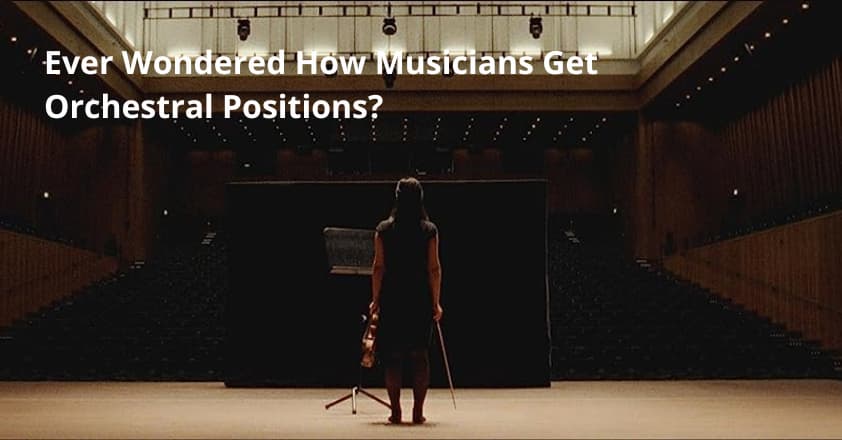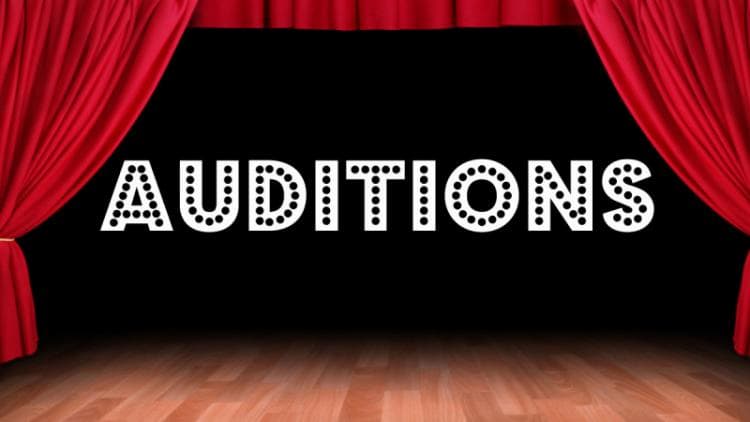It's all about the classical music composers and their works from the last 400 years and much more about music. Hier erfahren Sie alles über die klassischen Komponisten und ihre Meisterwerke der letzten vierhundert Jahre und vieles mehr über Klassische Musik.
Total Pageviews
Saturday, August 12, 2023
Yuja Wang/Through the Years: Ages 8~36
Piazzolla Libertango for Two Pianos Vera and Eugene Watanabe
Friday, August 11, 2023
The Merry Widow ballet - finale
Ever Wonder How Musicians Get Orchestral Positions?
by Janet Horvath
When you attend an orchestra concert you witness wonderful music-making from a singular group of musicians who seemingly play “as one.” If it’s an orchestra of stature some of the players will remain in their positions an entire lifetime—sometimes decades—and they learn to play together in a distinctive style and with uncanny telepathy. The members relate to one another as if they are a family, sharing not only the music, not only touring and traveling together but also important life events. But how does a musician get an orchestra position? Selection is usually based on a rigorous and often daunting audition process. Initially, once the musician wins an audition and signs a contract, he or she undertakes a probationary period of two years. During the trial period, the musician is evaluated for their playing in the larger context of the group as well as whether their temperament and personality are a good fit.

As you can imagine, the competition is fierce. Some of you may not know that each audition specifies repertoire to play, usually a dozen excerpts from the orchestral (or operatic) repertoire. Additionally, each candidate is also required to perform a concerto and a solo piece, usually solo Bach for string players. Like any competition, there are various rounds as each candidate is evaluated, starting with preliminary auditions, and ending with finals when the conductor is usually involved. The auditions are often held on the stage and initially, the candidate will play the first round behind a screen to maintain anonymity.
The committee that selects the candidates is comprised of eight to ten members of the orchestra—representatives of the section in which the opening has become available, and other musicians who are in that family of instruments. In the case of the French horns, it would be other French horn players, other brass musicians, and when the position is a principal position, the concertmaster, and other leading members.
There are exceptions of course. Some orchestras allow a tape recording for the preliminaries, and in the case of the Berlin Philharmonic, all musicians are in on the decision to hire a new player.
How does someone who has taken multiple auditions without a win, keep going and maintain motivation and a positive attitude? It’s important to take advantage of the resources that are available. Before the internet, when I took my auditions in the 1970s and 80s, the only way to get help was to have some lessons from an orchestral player.

One of the best online resources is Rob Knopper’s AuditionHacker.com, a Metropolitan Opera Orchestra member who knows what winning looks like. Rob’s inner circle is a nine-month commitment of Intensive audition coaching. Winning an audition comprises common sense details, persistence, dedication, and deliberate practice. A successful candidate understands that it’s about the process—learning how to perform the same way you do when you practice, to manage your nerves, to be organized, and to achieve the mindset required to play your best in the fifteen or so minutes you have.
If nerves get the better of you, and who among us hasn’t experienced the jitters, I recommend Noa Kageyama and The BulletProofMusician.com. Noa was a violinist plagued by performance anxiety before he became an expert sports psychologist and a faculty member at Juilliard School of Music. His site offers courses that can help.
When I performed my auditions sometimes the music was difficult to acquire. Today there are online resources with not only downloadable sheet music but also recordings of how these standards are typically played. OrchestraExcerpts.com features the standard excerpts by instrument. Music can also be found on IMSLP.
AuditionPlaybook.com offers individual coaching, guidebooks, interviews, and articles, including thoughts on meditation and mindfulness, practice hacks, even suggestions for pivoting to a career in music that isn’t in an orchestra.
Some professionals I know offer weekly virtual meetings to assess your audition preparation, but individuals can reach out to others to play for each other and give feedback. Weekly mock auditions virtual or otherwise are essential to learn what works and what doesn’t in your preparation. Other sites such as Stagetime, a performing arts hub, offers insider tips, advertises current opportunities and openings, and even offers some Audition Travel Stipends.
A successful audition boils down to these elements:
A decisive audition preparation schedule. Make certain you have plenty of lead time to master all the repertoire. Decide well in advance what your solo will be, choosing a work that is “in your fingers.” Avoid trying something new for an audition.
Determine how to play consistently. This will entail challenging yourself to play under varying conditions. Hold mock auditions enlisting your scariest friends, colleagues, or teachers. Tape yourself and listen for unintended variations in tempo or rhythm, unintended interruptions of the line due to breathing, bow changes, or inefficient shifting, and issues with dynamics.
Aim for peak performance. This will include determining what works in your routine that you can control in an audition setting for your body and mind. Choose foolproof fingerings. Make certain you are using standard bowings, tempos, phrasing, and dynamics for each excerpt.
Practice with a metronome. Intonation is of course essential but rhythmic steadiness and accuracy are crucial in an audition.
Study the music making certain you are not missing indications in the score such as dynamics, crescendos, accents, and phrasing, as well as interpretive musical terms. You should play Mozart differently than Strauss; Debussy differently than Brahms, but also a dolce passage differently than a passage marked espressivo; poco marcato differently than lebhaft. When an audition isn’t imminent become familiar with and practice the excerpts that show up at auditions time after time such as Rimsky-Korsakov Scheherazade movement II, K to L for the horns, Mahler Symphony No. 3, the opening of the second movement for the oboe, or Brahms Symphony No. 3 movement III the opening melody for the cellos.
Do your research. Listen to the excerpts. Where does your line fit in? What can you learn about the style of the orchestra you’re auditioning for? Who is their conductor and what can you glean about his or her approach? Every bit of knowledge will help you.
Most important play musically and try not to get discouraged if you don’t succeed initially. Winning depends on so many factors both internal and external. Whenever you play your best it’s a cause for celebration.
Thursday, August 10, 2023
John Williams Conducts 50 Years A Salute to Film Composers
Rosamunde Polka - German Oktoberfest song
Tuesday, August 8, 2023
Eugen Doga - his music and his life
Eugen Doga (born 1 March 1937) is a Soviet composer of Moldovan descent.
A creator of three ballets "Luceafărul", "Venancia", "Queen Margot", the opera "Dialogues of Love", more than 100 instrumental and choral works – symphonies, 6 quartets, "Requiem", church music, and other, plus music for 13 plays, radio shows, more than 200 movies, more than 260 songs and romances, more than 70 waltzes; he is also the author of works for children, the music for the opening and closing ceremonies of the Olympic Games in 1980 in Moscow.
In Moldova, the years 2007 and 2017 (when the composer celebrated his 70th and 80th birthdays, respectively) were declared the Year of Eugen Doga. Chișinău's main pedestrianised thoroughfare has been named Eugen Doga Street in his honour.
The World Intellectual Property Organization (Geneva) in recognition of his outstanding achievements in music awarded him with a special certificate in 2007.
Biography
Youth and education
Doga was born on 1 March 1937 in the village of Mocra in the Rîbniţa District (then in Moldavian Autonomous Soviet Socialist Republic), in a Romanian family.
The childhood of the composer coincided with a period of historical cataclysms – the war, repressions, hunger, poverty, exhausting hard work (the composer's memories of his childhood[.
After finishing seven years at school, Eugen Doga with his friends went to Chișinău (barefoot and without money, as he recalled later to enroll in the School of Music of which he learned about when listening to a homemade radio. He was admitted to the music school, despite having no prior training. Thanks to his natural talent and hard work, Eugen Doga managed to quickly catch up, mastered musical notation and learned to play cello. He still has the fondest memories of his cello teacher Pablo Giovanni Baccini, who with his personal example greatly influenced the future destiny of the composer.
"My second teacher, an old man by the name of Pavel Ivanovich Bachinin, became my salvation. I always think of him with joy. He scheduled my first lesson at 6 o'clock in the morning. I came in – he was already sitting there playing the piano. I liked him a lot – intelligent, very musical, and tactful. He worked with me every morning from 6:00 to 8:30, before lectures, for two and a half years. He taught me not only to play the cello, but simply to be a decent human being. He never said the word 'must', never used the imperative mood. However, through his own example, his attitude, he had taught me a lot,"- says Eugen Doga.
In 1951–1955 he studied at the Music School in Chișinău, specializing in cello, and then at the Conservatory where one of his classmates was a future opera star Maria Bieșu. She made her debut with his song.White flower garden" (Floare de dalbă liadă) on the Moldovan television. Paralysis of the left hand prevented a career of a musician – this was due to the fact that he used to live in a basement. Doga studied for another 5 years at the Art Institute "Gavriil Musicescu",[15] in the class of Professor S. Lobel specializing in composition. 1 January 1957 for the first time in his work, "New Year song" (Cântec de anul nou) was performed on the Moldovan radio children's choir and orchestra under the baton Shiko Aranova.In 1963, he wrote his first string quartet.
After graduating from the Conservatory in Chişinău, he performed as cellist in the Orchestra of the State Committee of the Moldavian Soviet Socialist Republic for television and radio (1957–1962), taught at the Music College "Stefan Neaga" from Chişinău (1962–1967), and worked from 1967 to 1972 at the repertory-editorial Board of the Ministry of Culture of Moldova.
He made his compositional debut in 1963, with a string quartet, later becoming the author of many musical compositions, theater scores and film soundtracks
